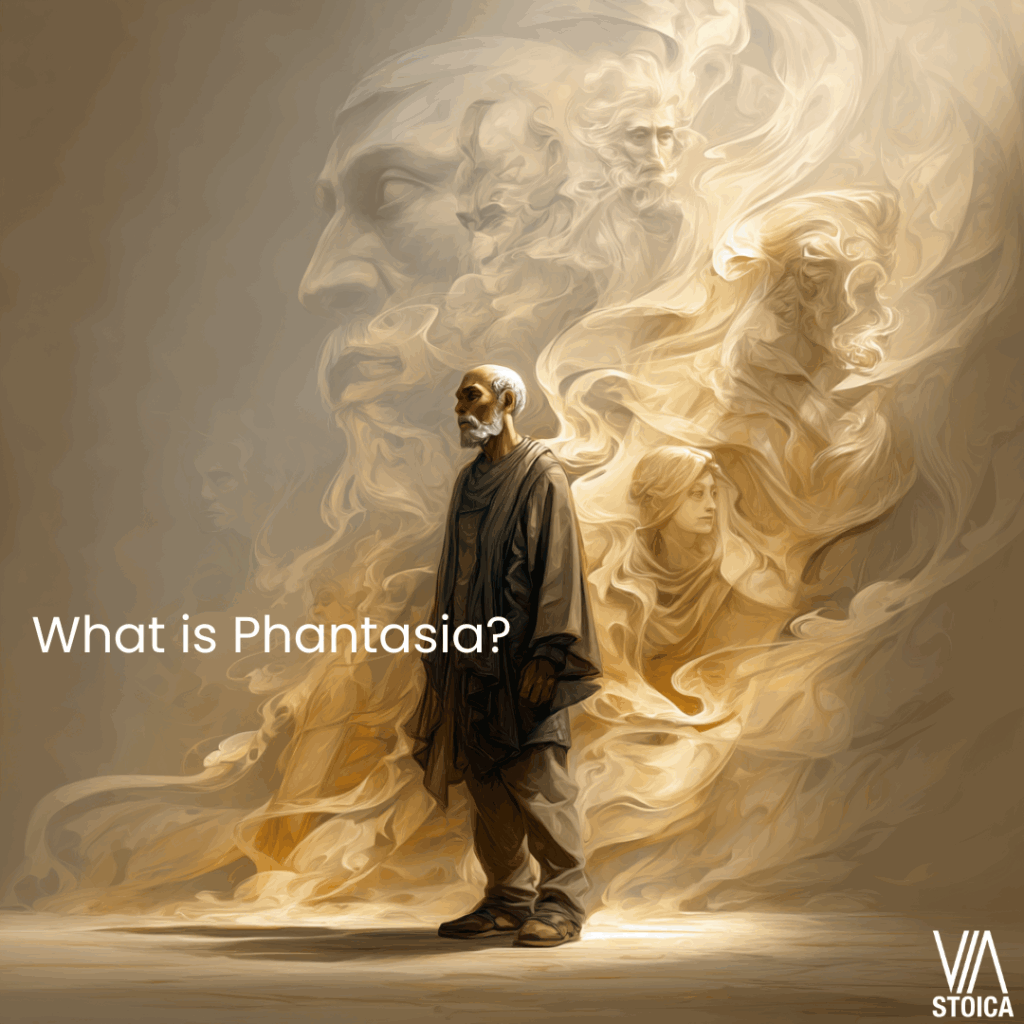
Why Phantasia Matters
Every moment, your mind is hit by a wave of impressions, someone’s comment, a headline, a sudden thought or image. The Stoics called these phantasiai (φαντασίαι): appearances, impressions, mental pictures. They’re automatic and triggered by all our senses. What happens after this phantasia is up to us.
The concept of phantasia is key in Stoic psychology. It teaches us how to pause between impulse and response and thus reclaim our freedom. If you’ve ever wanted to stop overthinking, reacting, or getting pulled into emotional spirals, this is the place to start.
Breaking Down the Word Phantasia (φαντασία)
In Greek, phantasia comes from phainō (φαίνω), meaning “to appear” or “to show.” It literally means something that “comes into view.”
To the Stoics, it described the raw impressions that strike our minds, whether through the senses, memory, or imagination. We must be careful, though, because not all impressions are true, and not all deserve approval.
This matters because our impressions often feel like reality. But the Stoics realized that they can be deceptive and that it is our responsibility to test them first.
Key Dimensions of Phantasia
- Automatic: Impressions arrive uninvited, and we don’t control them.
- Neutral events: Impressions are based on neutral events. Since these are external and powered by logos.
- Judged or Unjudged: We do control our judgment of them. That’s where freedom begins.
- True or False: Some impressions match reality. Others are distortions or assumptions.
- Emotionally Charged: Impressions often come with immediate emotional reactions. Stoic practice trains us to pause before acting.
Phantasia and Stoic Principles
- Virtue (ἀρετή): Responding well to impressions is a sign of moral strength.
- Reason (λόγος): Use rational judgment to assess impressions rather than reacting.
- Nature (φύσις): Living according to nature means not letting false impressions rule us.
- Wisdom (σοφία): The wise person questions appearances and sees clearly.
- Community (κοινωνία): By mastering our impressions, we create less conflict and more clarity in our relationships.
Common Misunderstandings
- Phantasia vs. Fantasy: Modern readers might confuse this term with imagination or make-believe. But Stoic phantasia is more grounded, it’s about how we color and shape reality.
- Impression vs. Belief: An impression is just an appearance. Belief is what we add to it. Stoics separate the two.
Why Phantasia Is Central to Stoicism
If we can’t control our impressions, what can we control? Our response.
As Epictetus says:
“Practice, then, from the start to say to every harsh impression, ‘You are an impression, and not at all the thing you appear to be.’ Then examine it and test it by these rules which you have, and firstly, and chiefly, by this: Whether the impression has to do with things which are up to us, or those which are not, and, if it has to do with things that are not up to us, be ready to reply. ‘It is nothing to me. “
Epictetus, The Handbook, 1
The Stoics believed that all emotions begin with a faulty judgment of an impression. By mastering phantasia, we master ourselves.
How to Practice Phantasia Daily
- Pause Practice: When something triggers you, say mentally: “Is this just an impression?”
- Impression Journal: At the end of the day, write down strong impressions and your response to them. What belief followed?
- Labeling Exercise: Name the impression before judging it. Example: “This is an image of failure, not failure itself.”
- Reality Check: Ask, “Do I know this is true, or am I filling in the gaps?”
Common Questions
What does phantasia mean in Stoicism?
It refers to the raw appearances or impressions we receive through the senses and mind.
Can we stop impressions from coming?
No. But we can decide how to respond to them, that’s the practice.
Is phantasia the same as perception?
Not quite. It’s broader. It includes sensory data, memory, imagination, and any mental impression.
Conclusion
The Stoics didn’t try to block or suppress impressions. They learned to see them for what they were without getting swept away. Phantasiai reminds us that while we can’t control what shows up in our mind, we can control what we do with it.
This is where your power lives: in the pause, the choice, the clarity between appearance and action.
Time for Action
Today, notice one strong impression that grabs your attention. Don’t believe it right away. Pause. Say: “Let me see what you are.”
🔗 Want to explore more Stoic strategies? Book a free consultation with one of our Stoic Coaches or learn about more Stoic philosophy terms. You can also listen to the Via Stoica podcast on Spotify or Apple Podcasts or watch it on YouTube.



0 Comments